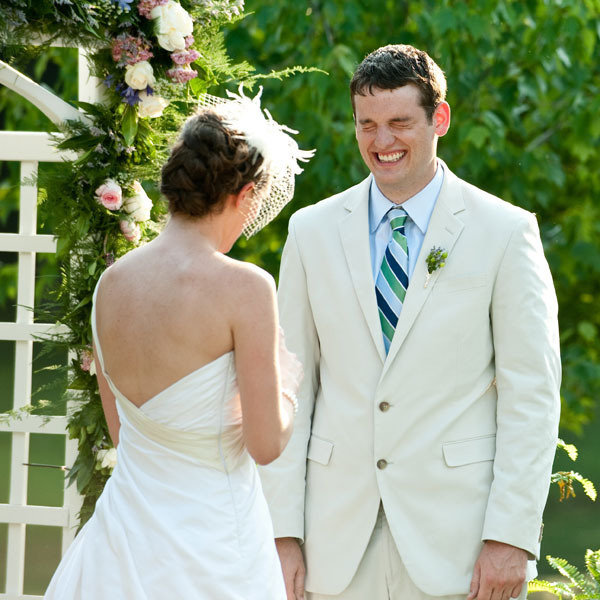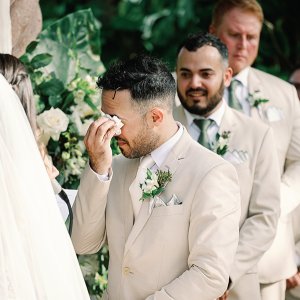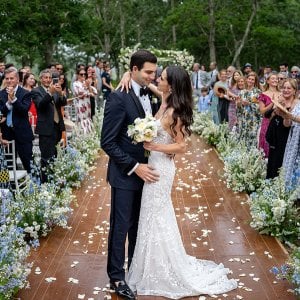Looking for traditional wedding vows? Find standard ceremony vow examples from religion and culture, plus tips for customizing your marriage vow exchange.
By: Susan Lee Smith
Photo Credit: Bowersock Photographers
For centuries, marrying couples recited the wedding vows of their particular religious or cultural tradition—perhaps without even considering an alternative. It wasn't until the latter half of the twentieth century that the rote recitation of traditional wedding vows came into question and that many couples chose to recite wedding vows of their own creation, in place of traditional wedding vows or in addition to them. Still, most couples find it useful to refer to traditional wedding vows script, even if only as a jumping-off point for creating their personal wedding vows.
Religious Wedding Vows
Whether or not you wish to be married within a particular religious tradition, whether or not you wish to recite traditional wedding vows or the wedding vows of any particular faith, you may find it helpful to read through this collection of traditional religious wedding vows. Read carefully, noting any words or phrases that stand out to you, that are relevant to you and your relationship. You may decide you want to incorporate particular phrases and expressions into your customized wedding vows. You may find that a religious wedding vow, adapted to remove any explicit religious references, will suit your ceremony plans perfectly. However, take care when adapting traditional wedding vows to ensure that you don't unwittingly show disrespect for the traditions from which you are borrowing.
Here is a summary of the wedding vow traditions for several major religions, denominations, and sects; also noted are religious traditions that do not normally include spoken wedding vows.
Buddhist
The Buddhist ceremony traditionally does not include an exchange of spoken wedding vows.
Eastern Orthodox
In the Eastern Orthodox tradition, the couple's wedding vows are silent; however, one sect of the Eastern Orthodox Church, the Carpatho-Russian Orthodox sect, sometimes includes the spoken expression of these wedding vows :
"I, [speaker's name], take you, [partner's name], as my wedded [wife/husband], and I promise to love, honor, and respect; to be faithful to you; and not to forsake you until death do us part. So help me God, one in the Holy Trinity, and all the Saints."
Episcopal
"I, [speaker's name], take you, [partner's name], to be my wedded [husband/wife], to have and to hold from this day forward, for better, for worse, for richer, for poorer, in sickness and in health, to love and to cherish, till death do us part, according to God's holy ordinance; and thereto I give thee my troth."
Or: "In the name of God, I, [speaker's name], take you, [partner's name], to be my wedded [wife/husband], to have and to hold, from this day forward, for better, for worse, for richer, for poorer, in sickness and in health, to love and to cherish, until parted by death. That is my solemn vow."
Hindu
The traditional Hindu wedding celebration includes a celebration of the seven steps, which correlate to seven wedding vows on the nature of the marriage commitment. The wedding vows may be recited by the couple, although many couples choose to physically or symbolically represent the wedding vows. Among the wedding vows or steps sometimes recited verbally are these:
"Let us take the fourth step, to acquire knowledge, happiness, and harmony by mutual love and trust. Finally, let us take the seventh step and become true companions and remain lifelong partners by this wedlock."
Interfaith (Ecumenical, Monotheistic)
"[Partner's name], I now take you to be my wedded [wife/husband], to live together after God's ordinance in the holy relationship of marriage. I promise to love and comfort you, honor and keep you, and forsaking all others, I will be yours alone as long as we both shall live."
Jewish
In the traditional Jewish ceremony, the wedding vow of greatest importance is spoken in conjunction with the presentation of the ring.
In the Reform wedding service, this wedding vow may also be included, directed toward the groom and the bride, one at a time:
Rabbi: "O God, supremely blessed, supreme in might and glory, guide and bless this groom and bride. Standing here in the presence of God, the Guardian of the home, ready to enter into the bond of wedlock, answer in the fear of God, and in the hearing of those assembled: Do you, [partner to whom the rabbi is speaking], of your own free will and consent, take [other partner] to be your [wife/husband], and do you promise to love, honor, and cherish [her/him] throughout life?"
Groom/Bride: "I do."
The Rabbinical Assembly Manual, a guide for many Conservative synagogues, provides this vow exchange for the ceremony, which includes the ring vow and is led by the rabbi:
Rabbi (to the groom): "Do you, [groom's name], take [bride's name] to be your lawful wedded wife, to love, to honor, and to cherish?"
Groom: "I do."
Rabbi (to the bride): "Do you, [bride's name], take [groom's name] to be your lawful wedded husband, to love, to honor, and to cherish?"
Bride: "I do."
Rabbi: (to the groom): "Then, do you, [groom's name], put this ring upon the finger of your bride and say to her: "Be thou consecrated to me, as my wife, by this ring, according to the law of Moses and of Israel."
The groom repeats the wedding vow as directed by the rabbi. The rabbi then asks the bride to repeat after him this wedding vow: "May this ring I receive from thee be a token of my having become thy wife according to the law of Moses and of Israel." Or, if the bride is presenting the groom with a ring, she may repeat after the rabbi, "This ring is a symbol that thou art my husband in accordance with the law of Moses and of Israel."
In some services the bride or groom may recite wedding vows based on the Song of Songs 7:10: "I am my beloved"s, and my beloved is mine."
Lutheran
"I take you, [partner's name], to be my [husband/wife] from this day forward, to join with you and share all that is to come, and I promise to be faithful to you until death parts us."
Methodist
"In the Name of God, I, [speaker's name], take you, [partner's name], to be my [husband/wife], to have and to hold, from this day forward, for better, for worse, for richer, for poorer, in sickness and in health, to love and to cherish, until we are parted by death. This is my solemn vow."
Muslim
The traditional Muslim ceremony focuses on the moment when the officiant explains the nature of the bride and groom's commitment to one another, and they acknowledge their consent to be married to one another—not the exchange of wedding vows. However, the Muslim ceremony does traditionally include this exchange:
Bride: "I, [bride's name], offer you myself in marriage in accordance with the instructions of the Holy Qur"an and the Holy Prophet, peace and blessing be upon Him. I pledge, in honesty and with sincerity, to be for you an obedient and faithful wife."
Groom: "I pledge, in honesty and sincerity, to be for you a faithful and helpful husband."
Presbyterian
"I, [speaker's name], take you to be my [wife/husband], and I do promise and covenant, before God and these witnesses, to be your loving and faithful [husband/wife], in plenty and in want, in joy and in sorrow, in sickness and in health, as long as we both shall live."
Protestant
"I, [speaker's name], take you, [partner's name] for my lawful [wife/husband], to have and to hold, from this day forward, for better, for worse, for richer, for poorer, in sickness and in health, to love and to cherish, till death do us part, according to God's holy ordinance; and therefore I pledge thee my faith."
Roman Catholic
"I, [speaker's name], take you, [partner's name], for my lawful [wife/husband], to have and to hold, from this day forward, for better, for worse, for richer, for poorer, in sickness and health, to love and to cherish, until death do us part."
Or: "I, [speaker's name], take you, [partner's name], to be my [husband/wife], I promise to be true to you in good times and in bad, in sickness and in health. I will love and honor you all the days of my life."
Quaker
"In the presence of God and these our Friends, I take thee to be my [wife/husband], promising with Divine assistance to be unto thee a loving and faithful [husband/wife] so long as we both shall live."
Unitarian/Universalist
"I, [speaker's name], take you, [partner's name], to be my [wife/husband], to have and to hold, from this day forward, for better, for worse, for richer, for poorer, in sickness and in health, to love and cherish always."
Or, in a more interrogatory version, led by the officiant: Officiant: "[Partner to whom the officiant is speaking], will you take [other partner] to be your [husband/wife]; will you love, honor and cherish [him/her] now and forever more?" The bride and groom in turn answer: "I will."
The officiant then directs the bride and groom to repeat after him (one at a time): "I, [speaker's name], take you, [partner's name], to be my [husband/wife]; to have and to hold from this day forward, for better, for worse, for richer, for poorer, in sickness and in health, to love and cherish always."
The officiant then asks the bride and groom (one at a time): "[Partner to whom the officiant is speaking], will you have [other partner] to be your [husband/wife], to live together in creating an abiding marriage? Will you love and honor, comfort and cherish [him/her], in sickness and in health, in sorrow and in joy, from this day forward?" The bride and groom in turn answer: "I will."
United Church of Christ
"I, [speaker's name], take you, [partner's name], to be my [husband/wife], and I promise to love and sustain you in the bonds of marriage from this day forward, in sickness and in health, in plenty and in want, in joy and in sorrow, till death shall part us, according to God's holy ordinance."
Other Religious Wedding Vows
"I, [speaker's name], take you, [partner's name], to be my [wife/husband], and I do so commit myself, before God and this company, to be your loving and faithful [wife/husband]."
Or: "I, [speaker's name], take you, [partner's name] to be my wedded [wife/husband], to have and to hold, from this day forward, for better, for worse, for richer, for poorer, in sickness and in health, to love and to cherish, till death do us part, according to God's holy ordinance; and thereto I pledge you my faith."
Or: "I [speaker's name], make with you, [partner's name], this covenant of marriage, to live with you according to God's will. I promise to love and trust you, to speak the truth to you, to sustain and nurture you, and with you to receive each day as a gift from God."
Non-Religious Wedding Vows
These commonly used non-religious wedding vows might provide you with ideas, words, and phrases to be incorporated into your personalized wedding vows.
Interfaith (Nonreligious)
For an interfaith ceremony, many couples opt to recite wedding vows that combine their specific religious traditions; others prefer to use wedding vows, such as this one, that do not refer to any particular belief or tradition:
Officiant: "I, [speaker's name], take you, [partner's name], to be my [wife/husband]. I promise to be true to you in good times and in bad, in sickness and in health. I will love you and honor you all the days of my life."
For an interfaith ceremony, many couples choose to recite wedding vows that combine their specific religious traditions; others prefer to use wedding vows, such as this one, that do not refer to any particular belief or tradition:
Civil Ceremony
Officiant: "I, [partner's name], take you to be my lawfully wedded [husband/wife]. Before these witnesses I vow to love you and care for you as long as both shall live. I take you with all your faults and your strengths as I offer myself to you with my faults and strengths. I will help you when you need help, and I will turn to you when I need help. I choose you as the person with whom I will spend my life."
Other Non-Religious Wedding Vows
Officiant: "[bride's name], do you take [groom's name] to be your husband; to live together with him in the covenant of marriage? Do you promise to love him, comfort him, honor and keep him, in sickness and in health; and, forsaking all others, to be faithful unto him as long as you both shall live?"
Bride: "I do."
Officiant: "[groom's name], do you take [bride's name] to be your wife; to live together with her in the covenant of marriage? Do you promise to love her, comfort her, honor and keep her, in sickness and in health; and, forsaking all others, to be faithful unto her as long as you both shall live?"
Groom: "I do."
Or:
"I, [speaker's name], take you, [partner's name], to be my wedded [husband/wife], to have and to hold, from this day forward, for better, for worse, for richer, for poorer, in sickness and health, to love and to cherish, till death do us part."
Or:
"I, [speaker's name], take you, [partner's name], to be my [husband/wife], to have and to hold, from this day forward, for better or for worse, for richer or for poorer, in sickness and in health, to love and to cherish as long as we both shall live."
Or:
"I, [speaker's name], take you, [partner's name], to be my [husband/wife]. I faithfully promise to love and support you from this day forward, in sickness and health, in plenty and in want, in success and in failure, in joy and in worry, as long as we both shall live."
Or:
"I, [speaker's name], take you, [partner's name], to be my wedded [husband/wife], and in doing so, I commit my life to you, encompassing all sorrows and joys, all hardships and triumphs, all the experiences of life. A commitment made in love, kept in faith, lived in hope, and eternally made new."
Or:
"[Partner's name], I give myself to you to be your [husband/wife], and I promise to love and sustain you in the covenant of marriage, from this day forward—in sickness and in health, in plenty and in want, in joy and in sorrow, as long as we both shall live."
Or:
"[Partner's name], I give myself to you to be your [husband/wife], I pledge to share my life openly with you, to speak the truth to you in love. I promise to honor and tenderly care for you, to cherish and encourage your own fulfillment as an individual through all the changes of our lives."
Wedding Ring Vows
In many traditional ceremonies, the exchange of weddng vows between the bride and groom continues with the recitation of additional wedding vows during the exchange of rings. Typically, in a double ring ceremony (where the bride and groom each receive a ring), the wedding vow is essentially identical, with merely a switching of the nouns or pronouns as needed; if only the bride is receiving a ring, she of course does not recite the wedding vow. Many religious traditions have a standardized set of wedding vows for the ring exchange.
Episcopal
The groom places the wedding ring on the bride's hand, saying, "[Bride's name], I give you this ring as a symbol of my wedding vow, and with all that I am and all that I have, I honor you, in the name of the Father, and of the Son, and of the Holy Spirit." In a double ring ceremony, the priest then blesses the groom's ring, which the bride places on the groom's finger as she recites the same sentence.
Jewish
Before placing the ring on the bride's hand, the groom says, "Harey at mekuddeshet li b"taba"at zo k"dat Moshe v"Israel" (in English: Behold, thou art consecrated unto me with this ring according to the law of Moses and of Israel"). The groom then places the ring on the bride's index finger (most Jewish brides later move the ring to the third finger of the left hand). In traditional Orthodox and some Conservative Jewish ceremonies, the groom does not receive a ring. However, if the groom is to receive a ring, the bride, in like manner, recites the same sentence (adjusted as necessary to reflect the gender differences) and places the groom's ring on his finger.
Presbyterian
The groom places the bride's ring on her finger, saying, "This ring I give you, in token and pledge of our constant faith and abiding love." In a double ring ceremony, the bride then places the groom's ring on his finger and recites the same sentence.
Protestant
The officiant blesses the rings, and then the groom places the ring on the bride's finger, saying, "I give you this ring as a symbol of my love; and with all that I am and all that I have, I honor you, in the name of the Father, and of the Son, and of the Holy Spirit." In a double ring ceremony, the bride then places the groom's ring on his finger and recites the same sentence.
Roman Catholic
The priest blesses the bride's ring, then the groom places it on her finger, saying, "In the name of the Father, the Son, and the Holy Spirit, take and wear this ring as sign of my love and faithfulness." In a double ring ceremony, the priest then blesses the groom's ring, which the bride places the groom's finger as she recites the same sentence.
Quaker
Traditionally, the Quaker bride and groom do not exchange rings; hence there are no Quaker ring vows.
Unitarian/Universalist
The groom places the bride's ring on her finger, saying, "With this ring, I wed you, and pledge you my love, now and forever." In a double ring ceremony, the bride then places the groom's ring on his finger and recites the same sentence.
From the book Wedding Vows: Beyond Love, Honor, and Cherish by Susan Lee Smith. Reprinted with permission of Warner Books, Inc, New York, NY. All rights reserved.








